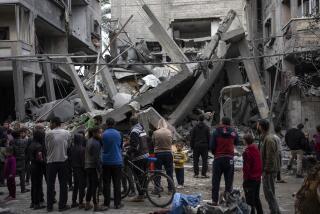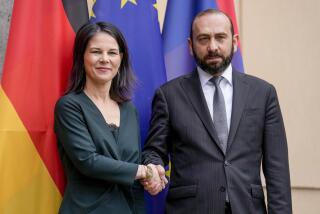Airlifts of assistance to begin across Syria
World leaders meeting in Munich, Germany, forged an agreement on Friday to begin aid drops to besieged areas of Syria and pursue a “cessation of hostilities,” even as the country’s embattled leader vowed to regain control over all parts of the country.
According to a statement released by the U.S. State Department, members of the International Syria Support Group, a 17-nation coalition, agreed to start airlifts of assistance to besieged areas across Syria.
“Once we get clearance by concerned parties, the U.N. and its humanitarian partners will be able to reach the civilians in need within the coming days,” said U.N. Special Envoy Staffan de Mistura, according to a news statement released by the United Nations on Friday.
Join the conversation on Facebook >>
He said there would be a follow-up meeting next week to assess progress and “maintain the pressure for incremental and unimpeded aid deliveries.” Some areas, such as portions of the city of Aleppo, are said to be in dire need of essential supplies, including food and water.
The statement added that the ceasefire would begin in one week.
The pause in fighting does not apply to “groups designated as terrorist organizations by the United Nations Security Council,” including the extremist group Islamic State and Al Qaeda’s Syrian affiliate, the Nusra Front, the statement said.
Earlier attempts to create a list of terrorist organizations in Syria have floundered; many of the countries involved in the negotiations have provided material and logistical support to groups involved in the conflict.
The declaration comes in the midst of a large-scale offensive by pro-government forces that has made deep inroads into the armed opposition fighting against Syrian President Bashar Assad’s government as they push to secure the country’s border with Turkey.
NEWSLETTER: Get the day’s top headlines from Times Editor Davan Maharaj >>
The government campaign is backed by Russian forces deployed in the country since last September. Moscow has said it is there to combat Islamic State militants. Critics, however, contend that its attacks have focused on so-called moderate rebel groups, including the Western supported Free Syrian Army.
Throughout the almost five-year civil war, Ankara has given the opposition unfettered access across the 500-mile Syrian-Turkish border, allowing rebel factions to conduct operations inside Syria while using Turkish towns across the border rear-guard bases.
The fighting has forced thousands of people to flee to the Turkish border. Ankara, however, has refused to allow their entry into Turkish territory.
Many remain in the city of Azaz, approximately four miles southwest of the Turkish border.
“The city is full of refugees now. There are no more places to stay,” said Murad Shawakh, a resident in Azaz reached via social media.
“There no more tents. There are three to four families per tent,” he said.
The government’s campaign has also raised the specter of a full siege of rebel-held sections of Aleppo, a city split between the opposition and the government since the summer of 2012.
Although Aleppo is not yet completely encircled, the siege has forced aid agencies to resort to a much longer route to the city than normally would be the case, according to Dalia Awqati, director of northern Syria programs for the aid group Mercy Corps.
Both sides appear to have little faith in a ceasefire.
In an interview with the Agence France Presse news agency on Friday, a defiant Assad insisted he would seek to restore government control over the country “without any hesitation,” according to a transcript released by Syrian state news agency SANA.
“It makes no sense for us to say that we will give up any part,” he said.
Rebels in Aleppo cast doubt on the prospects for the ceasefire holding.
“Neither a week, nor two weeks. It’s an open battle and the Russian bombing won’t stop,” said Mustafa Hussein, a rebel with the Western-backed Suqoor Al-Jabal brigade contacted via social media.
He insisted that Russia would use the stipulation that fighting continue against the Islamic State and Nusra as an excuse to continue its attack on rebel groups.
“When the Russians bombed our headquarters last October, they declared they had bombed sites for Daesh,” he continued, referring to the Islamic State by its Arabic acronym.
“Nothing will change. They’ll keep bombing us and say we’re Daesh.”
Bulos is a special correspondent.
ALSO
Editorial: Where’s the outrage on Syria?
George Clooney and wife Amal meet with German chancellor about Syrian refugees
World powers announce plans for cease-fire in Syria after nearly five years of civil war
More to Read
Start your day right
Sign up for Essential California for news, features and recommendations from the L.A. Times and beyond in your inbox six days a week.
You may occasionally receive promotional content from the Los Angeles Times.







